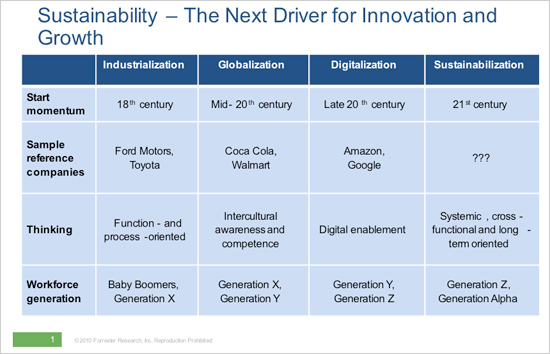IT For Sustainability Will Drive The Next Wave Of Corporate Evolution

Environmental concerns like climate change have not yet become the primary driver for businesses to define, implement, and execute a dedicated sustainability strategy. Rather, sustainability initiatives are driven today by cost and efficiency opportunities.
However, many companies are realizing that sustainability is increasingly important to advance their brand and competitive differentiation, respond to rising customer and regulatory pressures, attract new generations of talent, and enter or even create new markets. While the growth side of sustainability seems to be generally recognized, it is much more complex to measure and, hence, to manage, than the cost side.
Thus, we see widely varying approaches to corporate sustainability, and many companies are still reluctant to pursue sustainability at all.
A recent Accenture study of 766 CEOs, conducted in cooperation with the UN Global Compact, found that brand, trust, and reputation is the most frequently-cited driver for pursuing sustainability, followed by potential revenue growth/cost reduction, and personal motivation. Interestingly, CEOs rank pressures from governments/regulatory and investors/shareholders at the low end of their motivation scale (see Figure 1 below).
In our understanding, the underlying challenge to incorporating sustainability is to shift from applying traditional — industrial-inspired — thinking and approaches, formed and nurtured by education and businesses for more than a century. Hence it is not surprising to see that 88 percent of the CEOs surveyed by Accenture and the UN Global Compact state that is important/very important that educational systems and business schools must develop mindsets and skills for future leaders to address sustainability.
Sustainability is about changing the perspective and approach to become a true lever for innovation over the next decade. We see "sustainabilization" arising as the fourth driver for economic innovation and growth, building upon the previous waves: industrialization (shift from agricultural to industrial economy), globalization (globally distributed value chains), and digitalization (shift from industrial to information economy through the advent of ICT).
While there are important differences among the three previous drivers, the key metrics of economic success — increasing revenue and profit — haven't changed. In addition, the key corporate stakeholders for companies affected by these drivers internally (e.g., management, employees) and externally (e.g., shareholders, governments, customers) remain the same, too.
This is different with sustainability, where metrics of success and stakeholders expand beyond the traditional levers. Hence, sustainability is about broadening the existing metrics and approaches to be successful. It requires systemic thinking, cross-functional and long-term orientation. The new stakeholder is not a person or institution, but the environment, and the new performance is the convergence of both financial and sustainability metrics.
Companies must create new business models to capitalize on the sustainability opportunity and adapt to new generations of their workforce (see Figure 2).
While it is relative easy to identify reference companies for the earlier phases of industrialization, globalization, and digitalization, the phase of sustainabilization still misses a native player, like a Ford with the introduction of the assembly line enabling mass production in the early car industry, or Amazon that disrupted the traditional retail industry. Google on the other hand can be considered as a truly digitalization-native company. So will we see a Google of sustainabilization? Or will companies simply progress into the next phase as we have seen in the previous phases?
Maybe we will not find examples in the private sector, but in the public sector there are already examples today: New cities such Masdar in the United Arab Emirates or Lavasa in India. These cities were designed from scratch as smart, i.e., sustainable, cities. An increasing number of such cities are arising, particularly in emerging markets. My colleague Jennifer Belissent just published a comprehensive report about ICT opportunities in smart cities.
Will new companies also be built from scratch based on the sustainability imperative from the outset as these new cities will be? As always, we appreciate your feedback.

